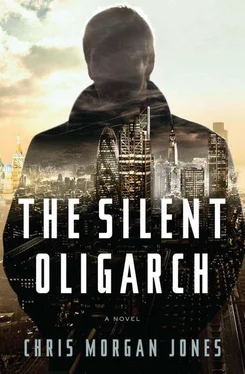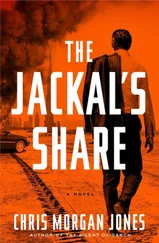Neither man wanted to be detained. Each had his own purpose: to clean up Lock’s room; to rescue Lock. For a second they stood, a yard apart, in an unlikely impasse. The man shifted to the side to let him by. As Webster moved past him, their eyes still locked, the man tripped him, sweeping his foot across and catching him on the ankle.
Webster lost his balance on the ice and fell heavily on his side with a leaden thud, the compacted snow hitting him like iron, his cheek pressing against the frozen sludge on the pavement. By instinct, like a boy, he reached out an arm, caught the bottom of the man’s trousers and pulled hard toward him. The man’s feet went out from under him and as he fell on the small of his back Webster scrambled with skating feet to get up. But he was barged from the side and the man was on top of him, hands grasping for his throat, Webster’s reach just long enough to keep him off. For a second they were joined in each other’s grip, raging eyes staring. Webster took a hand from the man’s shoulder and as he fell, off balance, jabbed him with two fingers in the eye; trying to get to his feet, his leather soles slipped hopelessly and he found himself on his knees, like a choirboy, reaching toward the car’s door to pull himself up. The man pulled at Webster’s coat, using it to get upright, until he too was on his knees, up close, searching for grip with his feet, reaching inside his coat pocket. His eyes were bright with fury. Webster grabbed the man’s lapels, arched backward, and snapped his head down with all its weight on his brow. He felt bone crack. The man’s body slumped in its clothes and Webster let it fall.
His breathing was short, his heart beating wildly. He looked up and down the street. He could see no one. He opened the man’s overcoat and went through his pockets. Euros, cigarettes, the car key. A knife. From his belt hung a holster and a matte-black pistol. No papers of any kind. Webster took the gun and the knife and pulled himself up against the car, panting, his trousers stiff with cold and ice. He picked up his bag and set off toward the canal, as quickly as he could, stopping only to slash two of the Mercedes’ tires and take a note of its number plate on his phone. The street was clear.
As he walked, quickly, almost a run, checking over his shoulder to make sure the man hadn’t revived, he looked at the gun. It was a Makarov, a Russian make. That was no surprise. What was puzzling was why the man had attacked him: it made no sense. Crossing the canal he threw the gun far out into the water where the ice had yet to form. I’m the only link they have to Lock, he thought. Why not simply follow me? Because I knew who he was, and I wouldn’t have let him.
He found a phone. He was still out of breath, and exhilaration was giving way to cold. Pulling his collar up, he leaned against it and dialed Hammer’s number. It rang only once.
“Lock’s safe. I don’t know how. I think they slipped him something. I’m picking him up now. Look, I need you to find us a bolt-hole. Somewhere not too far from Berlin where no one would think of looking.”
“Why don’t you just come home?”
“Because I think we can end this here. I’ll explain later. I’ll call in half an hour.”
IT TOOK HIM FIVE MINUTES to find a cab. Inside the heater was blowing and it was hot and dry. He gave the address and opened his window an inch. The driver—middle-aged, Turkish—drew his scarf around his neck and asked him if he was crazy, letting the cold in on a night like this. Did he want to kill him? Webster shut the window and looked out at Berlin. Mitte was busy. Just after nine on a Friday night. Everyone seemed young here. Frau Werfel aside, Webster couldn’t remember seeing a single old person in the city.
The cab drove north, past the Adlon, past the Hauptbahnhof. Eventually it pulled in to the side of the road. “Wir sind hier,” said the driver. “Gartenplatz.” Webster asked him to wait and got out. An immense gothic church rose up in black over the square. In the darkness he couldn’t see Lock and he could feel his breath quickening again, but then he spotted him at the other end of the road, propped against a lamppost.
“Richard,” said Webster, walking up to him. Lock’s eyes were closed. “Richard.” Lock didn’t respond. What had they done to him? Webster touched his arm. “Richard, are you OK?”
Lazily, Lock opened his eyes. He blinked twice and pulled his head back a little as if unable to focus.
“Richard, it’s Ben. Come on. You must be freezing. I’ve got a cab. Come on.” He put his arm around Lock and guided him carefully to the car, Lock struggling to keep his head upright. “Jesus, what have they given you?” Lock didn’t reply. Webster opened the door and eased him inside, his hand protecting his head.
“Is he drunk?” said the driver.
“He’s not well.”
“Is he going to be sick?”
“He’ll be fine. Can I borrow your phone?”
The driver turned to look at Webster.
“You don’t have a phone?”
“No. I need to borrow yours. It’s a short call. I’ll give you a big tip.” The driver shrugged his shoulders and passed his phone back behind him.
HAMMER HAD FOUND a guesthouse in Wandlitz, twenty miles north of Berlin. Lock slept, leaning against the door of the car. With his head hanging on his chest he looked like a wooden posing doll slumped on a shelf. Webster watched him, chastened. This wasn’t the man he’d been pursuing. That man was a cipher: a name on documents, a picture in magazines, a series of assumptions about his kind. This man breathed. He had weight and form. His face showed that he had loved and feared. On this cold night Webster felt finally awake.
The place wasn’t easy to find, and the driver missed it twice before Webster spotted the tiny sign pointing between two large villas. They drove down a narrow drive overarched with bare lime trees and pulled up in front of a large white house lit by two floodlights.
Webster got out of the car. It was no longer snowing, the wind had dropped, and the air was pure and heady, alpine. The moon was a day or two short of full but by its light he could make out beyond the floodlights a sailboat and a jetty held firm by sparkling gray ice. For a second he was thrown; this couldn’t be the sea. No, of course; this was one of the lakes. Wandlitzsee. He had heard of it. From somewhere in the dark he could hear the steady cracking of water freezing at the farthest edge of the ice. To his right, white ice in layers on the shore reflected the moon in clusters of pinprick lights.
Hammer had called ahead. Heaven knows what he had said but the proprietor of the Villa Wandlitz could not have been more obliging. He introduced himself as Herr Maurer, took the bag and, while Webster paid the driver, helped walk Lock into the house. When Webster began to explain that his friend was ill, that he had a migraine, Herr Maurer said that he knew, that this was a shame and he hoped Herr Webster’s friend would be feeling better come the morning. He didn’t want to know about credit cards or passports or anything else. Instead he took two keys from behind the reception desk, showed Webster and Lock into the lift and took them to adjoining rooms on the first floor. Breakfast was from seven until nine, but if they wanted to sleep late he would be very happy to make something specially for them. He didn’t even seem to notice Webster’s filthy clothes or the blood dried on his temple. Webster thanked him and said good night.
He took Lock’s coat off and draped it over a chair. It gave off a faint smell of vomit that he hadn’t noticed before. He shuffled him over to the side of the double bed, turning him around and letting him collapse onto it, took off his shoes and folded the duvet over him.
Читать дальше












